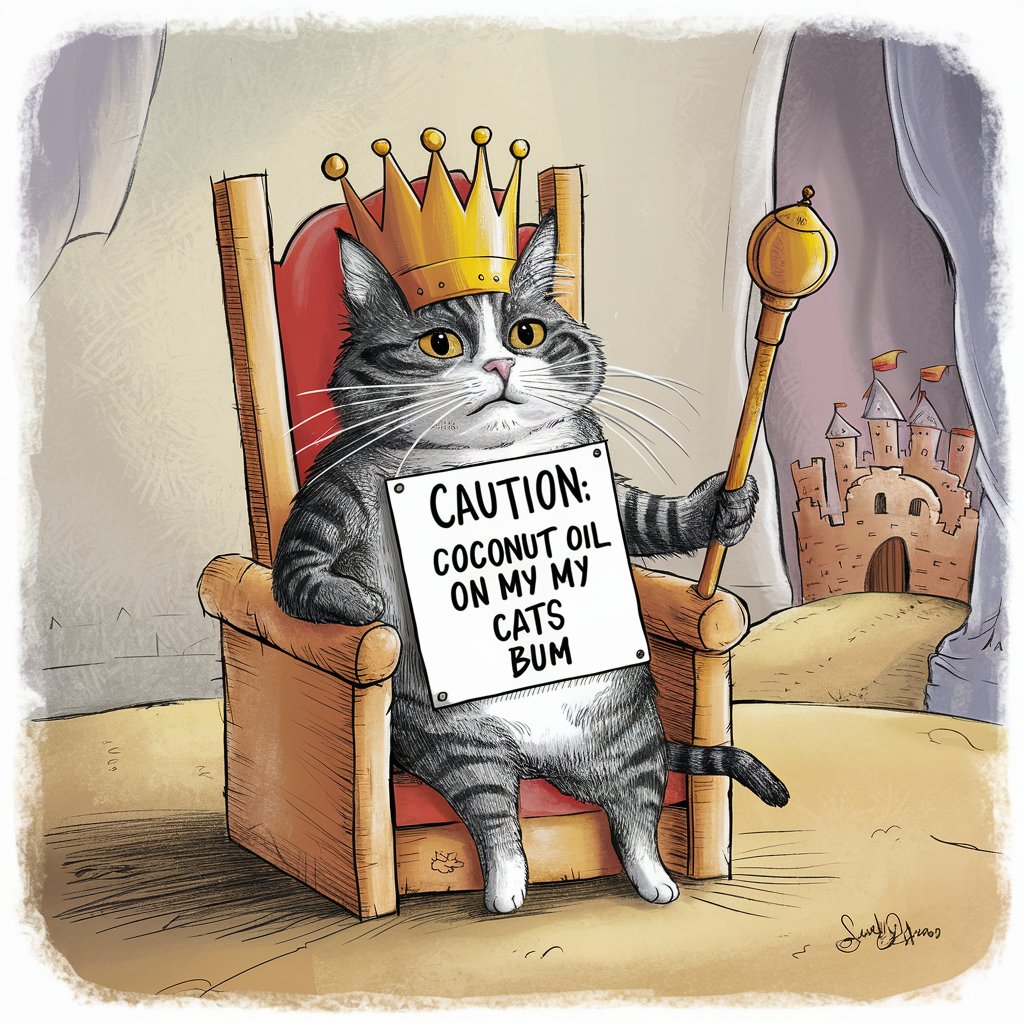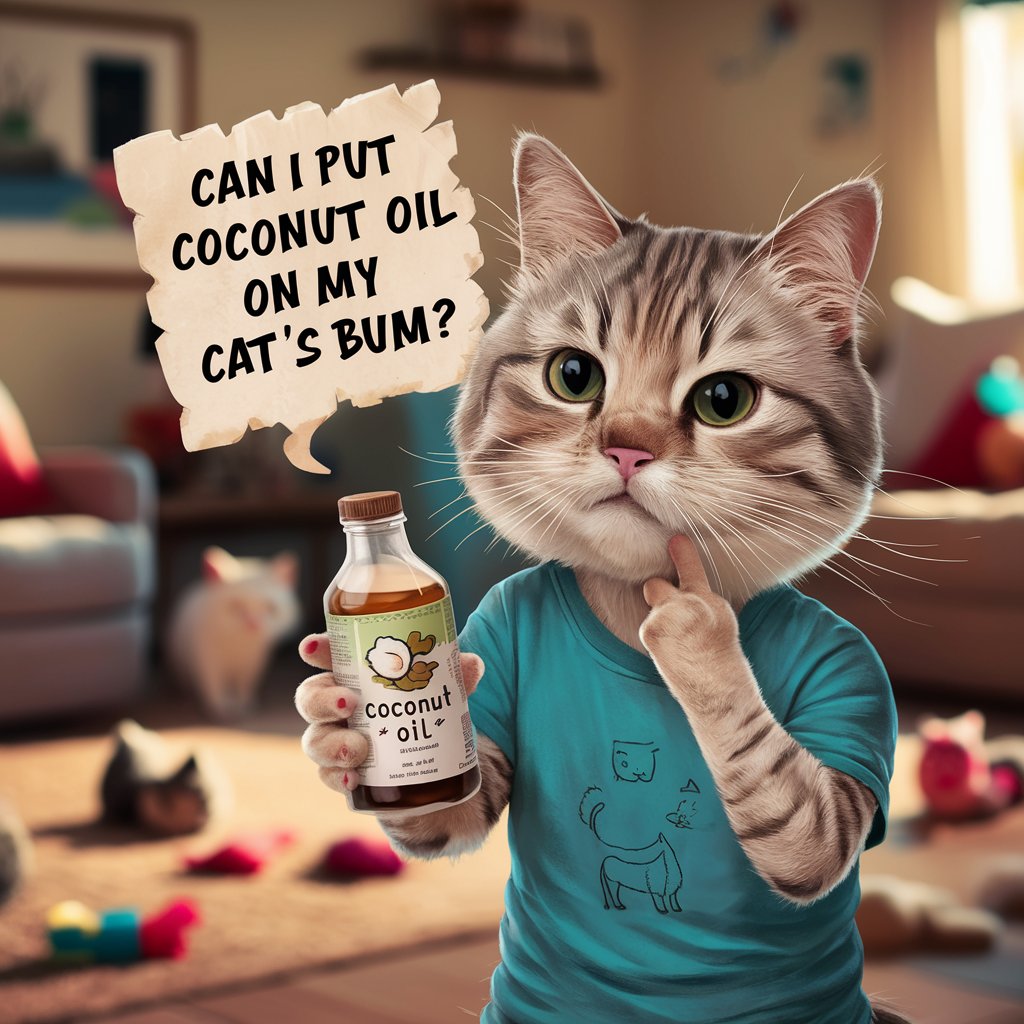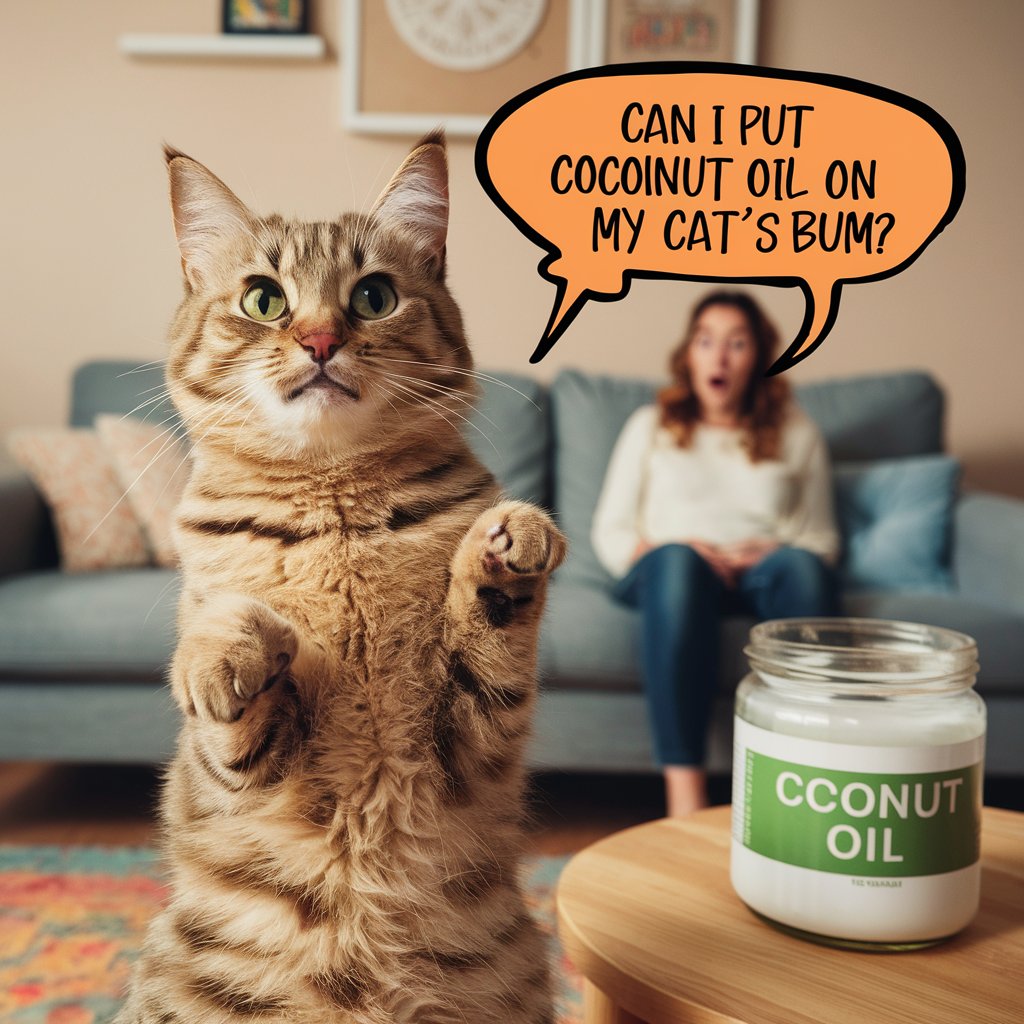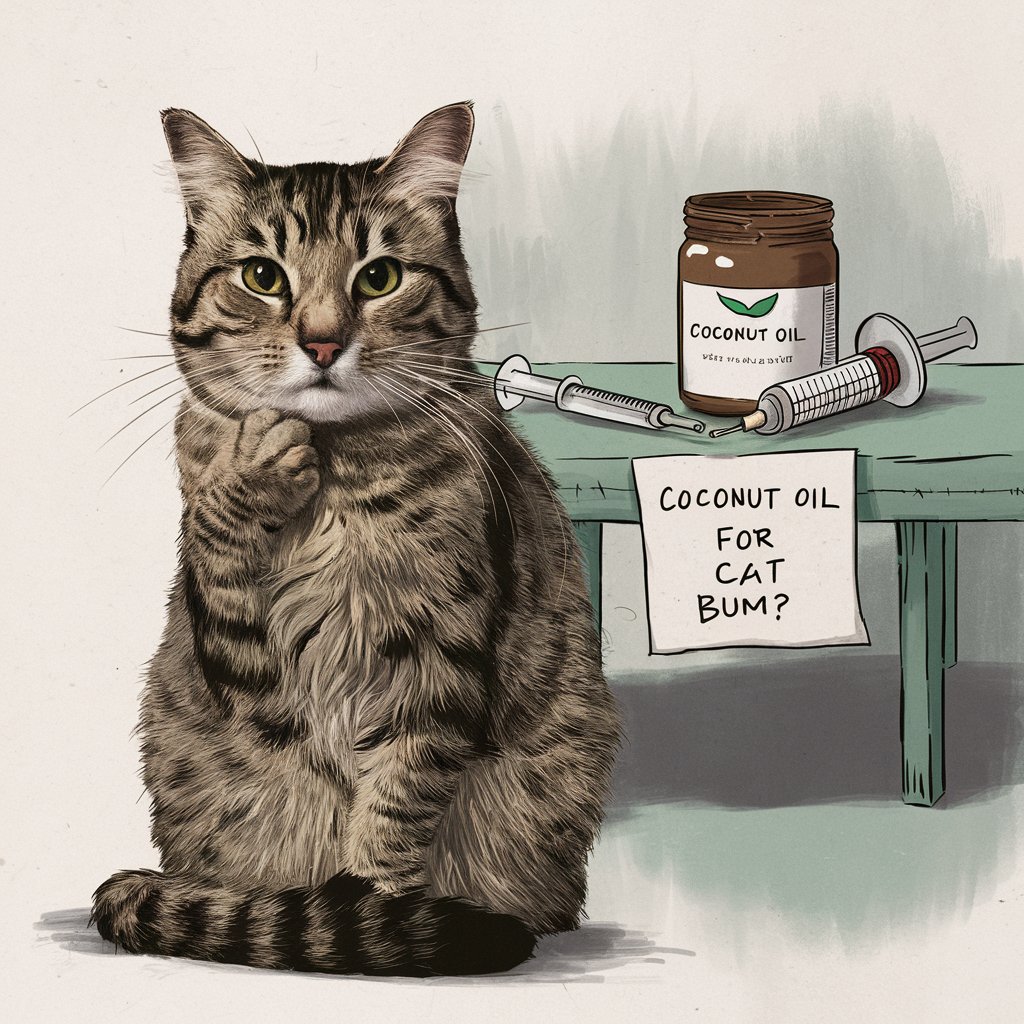Coconut oil is known for its excellent moisturizing properties.
Can I Put Coconut Oil on My Cat’s Bum? Understanding the Benefits and Risks
When it comes to maintaining your cat’s health and comfort, you might find yourself wondering, Can I Put Coconut Oil on My Cats Bum? Coconut oil is widely celebrated for its various uses in human health and beauty routines, but is it suitable for our feline companions, particularly in sensitive areas like their bum? In this comprehensive guide, we’ll explore the potential benefits and risks of using coconut oil on your cat’s bum, discuss alternative treatments, and provide tips on how to ensure your cat’s well-being.
What is Coconut Oil and Why Consider It?
Coconut oil is a versatile natural substance extracted from the flesh of mature coconuts, scientifically known as Cocos nucifera. It has been used for centuries in various cultures for its numerous health, beauty, and culinary benefits. Understanding what coconut oil is and why it might be considered for your cat involves exploring its composition, uses, and potential benefits.
Composition of Coconut Oil

Coconut oil is rich in saturated fats, particularly medium-chain triglycerides (MCTs), which make up about 60% of its fatty acid content. The key MCTs in coconut oil include:
- Lauric Acid: This fatty acid constitutes approximately 50% of coconut oil’s composition. Lauric acid is known for its antimicrobial and antiviral properties, which can potentially help in managing minor infections and skin irritations.
- Capric Acid: This MCT has antifungal and antibacterial properties, contributing to coconut oil’s ability to combat infections and support skin health.
- Caprylic Acid: This fatty acid also has antimicrobial effects and is believed to aid in digestive health by supporting the balance of gut flora.
Besides these MCTs, coconut oil contains small amounts of polyunsaturated fats and monounsaturated fats. It is also rich in vitamin E, an antioxidant that helps protect cells from damage.
Uses of Coconut Oil
Coconut oil’s versatility extends across several domains:
- Culinary Uses: It is commonly used in cooking and baking due to its high smoke point, which makes it stable at high temperatures. Its subtle coconut flavor can enhance dishes, particularly in tropical and Asian cuisines.
- Skin and Hair Care: Coconut oil is a popular ingredient in skincare and haircare products due to its moisturizing and conditioning properties. It is often used to treat dry skin, reduce inflammation, and improve hair texture.
- Health Benefits: The MCTs in coconut oil are believed to support metabolism and energy levels. Coconut oil is sometimes used as a natural remedy to improve digestive health and support overall immune function.
Why Consider Coconut Oil for Your Cat?

Given its range of benefits for humans, many pet owners wonder if coconut oil could be beneficial for their cats. Can I Put Coconut Oil on My Cats Bum? Here are some reasons why you might consider using coconut oil for your feline friend:
- Moisturization: Coconut oil’s rich fatty acids can provide deep hydration to dry skin. If your cat suffers from dry or flaky skin, a small amount of coconut oil may help alleviate discomfort and improve skin condition.
- Antimicrobial Properties: The lauric acid in coconut oil has antimicrobial effects that might assist in managing minor skin infections or irritations. This makes it an appealing option for pet owners looking for natural remedies.
- Flea and Tick Repellent: Some pet owners use coconut oil as a natural flea repellent. The oil can create a barrier on the skin that might deter fleas and ticks. However, this application should be done with caution and in consultation with a veterinarian.
- Digestive Health: Coconut oil is sometimes used to support digestive health. Its MCTs are thought to aid in digestion and promote a healthy gut environment.
Cautionary Notes
While coconut oil offers several potential benefits, it’s important to approach its use with caution:
- Skin Sensitivity: Cats have sensitive skin, and applying coconut oil might cause irritation or an allergic reaction in some cases. Always test it on a small area first before using it on a larger area.
- Ingestion Risks: Cats are natural groomers and may lick the oil off their skin. Excessive ingestion of coconut oil can lead to digestive issues such as diarrhea.
- Consult Your Veterinarian: Before introducing coconut oil into your cat’s care routine, it’s best to consult with a veterinarian to ensure it’s safe and appropriate for your cat’s specific health needs.
Understanding the composition and benefits of coconut oil helps in making an informed decision about its use for your cat. While it has several promising properties, always consider the safety and well-being of your feline companion when incorporating any new substance into their care regimen.
Can I Put Coconut Oil on My Cat’s Bum? Evaluating the Safety
When considering whether you should use coconut oil on your cat’s bum, several factors come into play: Can I Put Coconut Oil on My Cats Bum?
- Skin Sensitivity: Cats have sensitive skin, and applying coconut oil to their bum can potentially cause irritation. If you’re wondering, can I put coconut oil on my cat’s bum, remember that your cat’s skin might react differently than human skin.
- Ingestion Risks: Cats are natural groomers. If coconut oil is applied to their bum, they may lick it off, leading to ingestion. While small amounts of coconut oil are generally safe, excessive consumption can lead to digestive upset, including diarrhea.
- Effectiveness: Coconut oil is praised for its moisturizing properties, but there may be more effective and safer treatments for common bum issues in cats. If you’re asking, can I put coconut oil on my cat’s bum for a specific issue, consider whether it’s the most appropriate treatment.
Benefits of Coconut Oil for Cats

Coconut oil is often touted for its potential health benefits for humans, but it also offers several advantages for cats when used appropriately. Can I Put Coconut Oil on My Cats Bum? Here’s a detailed look at the potential benefits of coconut oil for your feline friend:
1. Moisturization of Dry Skin
2. Antimicrobial and Antifungal Properties
The lauric acid and capric acid in coconut oil possess antimicrobial and antifungal properties. These compounds can help manage minor skin infections and irritations by reducing the growth of harmful microorganisms. For example, coconut oil might be used to address small wounds, cuts, or fungal infections like ringworm, although it should not replace professional veterinary treatment for more serious conditions.
3. Support for Digestive Health
Coconut oil contains medium-chain triglycerides (MCTs) that are believed to aid in digestion and promote a healthy gut environment. MCTs can support the balance of gut flora, potentially improving digestion and nutrient absorption. Some pet owners use coconut oil as a supplement to help alleviate constipation or support overall digestive health, but it’s important to introduce it gradually and in small amounts.
4. Potential Flea and Tick Repellent
While not a substitute for proven flea and tick preventatives, coconut oil may act as a mild repellent. The oil can create a barrier on the skin that might deter fleas and ticks. However, its effectiveness as a repellent is limited compared to dedicated flea and tick treatments, and it should be used with caution. Always consult with your veterinarian for comprehensive flea and tick management strategies.
5. Support for Dental Health
Coconut oil can be beneficial for your cat’s dental health. Its antimicrobial properties can help reduce the growth of bacteria in the mouth, which may contribute to fresher breath and improved oral hygiene. Some pet owners use coconut oil as a supplement to help maintain their cat’s oral health, though regular dental check-ups and cleanings are still essential.
6. Enhanced Coat Condition
The moisturizing effects of coconut oil can also benefit your cat’s coat. Regular use can help improve the shine and softness of your cat’s fur, making it look healthier and more vibrant. A well-moisturized coat is less prone to tangles and breakage, contributing to overall grooming ease.
7. Allergy Relief
For cats with allergies that cause skin irritations, coconut oil might provide temporary relief. Its soothing properties can help alleviate itching and redness associated with allergic reactions. However, it’s crucial to identify and address the underlying cause of the allergies with the help of your veterinarian.
Related Article: “Can Cats Eat Mayo?” 6 Positive Alternatives
Caution and Considerations

While coconut oil has several potential benefits, it’s important to use it with caution: Can I Put Coconut Oil on My Cats Bum?
- Skin Sensitivity: Always perform a patch test before applying coconut oil to larger areas. Some cats might have skin irritation or allergic reactions.
- Ingestion Risks: Cats are likely to groom themselves and may ingest coconut oil. A small amount is usually safe, but too much can upset their stomach.
- Consult Your Vet: Always consult with your veterinarian before introducing coconut oil into your cat’s routine. They can provide guidance on proper usage and ensure it’s appropriate for your cat’s specific health needs.
In summary, coconut oil can offer several benefits for cats, from moisturizing dry skin to supporting digestive health. However, it should be used thoughtfully and in conjunction with professional veterinary advice to ensure the best outcome for your feline friend.
How to Safely Use Coconut Oil on Your Cat
If you still want to use coconut oil on your cat, here’s how to do it safely: Can I Put Coconut Oil on My Cats Bum?
- Patch Test: Before applying coconut oil to your cat’s bum, perform a patch test on a small area of their skin to check for any adverse reactions.
- Apply Sparingly: Use a very small amount of coconut oil. Focus on areas with dry skin or minor irritations rather than applying it directly to the bum. Avoid letting your cat lick the area where the oil is applied.
- Monitor for Reactions: Keep a close eye on your cat after applying coconut oil. Look out for any signs of irritation or discomfort, and discontinue use if you notice any negative reactions.
- Consult Your Veterinarian: It’s always a good idea to consult with your vet before introducing coconut oil into your cat’s care routine. They can provide personalized advice based on your cat’s health and needs.
Potential Risks and Concerns
When asking can I put coconut oil on my cat’s bum, it’s important to consider these potential risks:
- Allergic Reactions: Some cats might be allergic to coconut oil, leading to skin redness, itching, or swelling. If your cat shows any signs of an allergic reaction, stop using the oil immediately.
- Digestive Issues: If your cat ingests too much coconut oil, it can cause digestive problems such as diarrhea or an upset stomach. Be cautious about applying it in areas where your cat might lick.
- Ineffectiveness for Serious Issues: Coconut oil might not be effective for serious skin conditions or infections. If your cat has persistent or severe skin problems, seek veterinary advice for appropriate treatment options.
Alternative Treatments for Cat Bum Issues
If you’re concerned about using coconut oil, there are several alternative treatments for common issues around your cat’s bum:
- Pet-Specific Creams: There are creams and ointments designed specifically for cats. These products are formulated to be safe and effective for treating skin issues.
- Regular Grooming: Keeping your cat well-groomed can help prevent skin problems. Regular brushing and cleaning can reduce the risk of irritation and infection.
- Diet and Hydration: Ensuring your cat has a balanced diet and adequate hydration can improve overall skin health and reduce issues like dryness and irritation.
- Veterinary Solutions: If your cat has a persistent problem, consult with your vet. They can suggest safe and effective treatments based on your cat’s needs.

Conclusion:
Can I Put Coconut Oil on My Cats Bum? While coconut oil offers various benefits, it’s important to approach its use with caution. The potential risks, including skin irritation and digestive issues, mean it might not be the best choice for every cat. Always consult with your veterinarian before applying any new substance to your cat’s skin. If you decide to use coconut oil, do so sparingly and monitor your cat for any adverse reactions. There are many safe and effective alternatives available to help maintain your cat’s health and comfort.
FAQs: Can I Put Coconut Oil on My Cats Bum?
- Can I put coconut oil on my cat’s sore bum?
It’s best to consult your vet before using coconut oil on your cat’s sore bum. While coconut oil can be soothing for some skin issues, your vet can advise if it’s appropriate for your cat’s specific situation. - Is it safe to put coconut oil on a cat?
Coconut oil is generally safe for cats in small amounts, but it’s important to use it cautiously. Some cats may have allergic reactions or digestive issues, so it’s wise to consult with your vet before applying it. - How can I soothe my cat’s sore bum?
To soothe your cat’s sore bum, try the following:- Keep the area clean and dry.
- Use a vet-recommended ointment or medication.
- Ensure your cat has a comfortable, clean place to rest.
- Consult your vet for proper diagnosis and treatment.
- How to clean your cat’s bum?
To clean your cat’s bum:- Gently wipe the area with a damp, soft cloth or pet-safe wipes.
- Use lukewarm water and a mild soap if needed.
- Pat the area dry with a clean towel.
- Avoid using harsh chemicals or human products.
- If your cat’s bum is persistently dirty or irritated, consult your vet.

Welcome to Hypocats.com! I’m Khawar Akhtar, a passionate writer dedicated to all things feline. With a deep love for cats and a keen interest in their health, diet, and training, I strive to provide cat owners with valuable insights and practical advice to enhance their furry friends’ well-being. My goal is to share my expertise and enthusiasm for our whiskered companions, helping them lead happier, healthier lives. When I’m not writing, you’ll find me spending quality time with my Russian Blue cat, enjoying the simple joys that come with being a cat lover. Thank you for visiting Hypocats.com—I hope you find the information here as helpful and inspiring as I do!


Leave a Reply